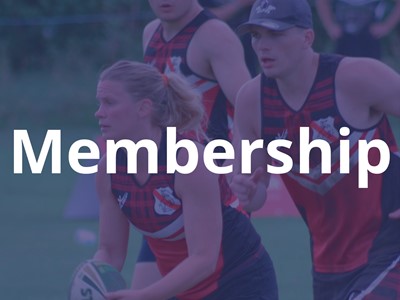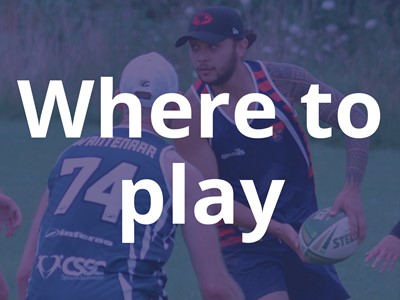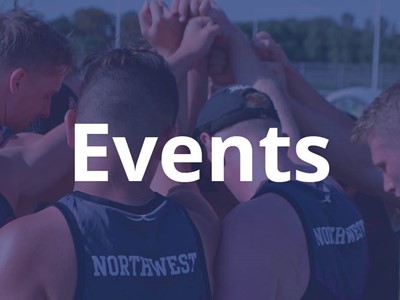Sign-up to receive all the latest news from England Touch
Celebrating Black History Month | Layo Aromire interview

Layo Aromire is a returning referee for England Touch, she has previously reffed in Australia for a few years and has played Touch and Premiership Rugby as well as other codes of oval ball sport. England Touch’s Diversity and Inclusion Officer Tatchen Dawodu-Alcide spoke to Layo about her Touch journey.
Tae: What was your journey into Touch?
Layo: My background in playing sport started with Athletics (Track and Field). Whilst at university, I then played a bit of basketball, but then I created and became the president of the Athletics Club at the University of West of England. In 2004, I basically wanted to do something separate from athletics. I had a friend, we both left basketball and she wanted to try out for Rugby Union, and I was going to try out for football. I said to her, “I'll go to your rugby session if you come to my football session.'' I turned up at her rugby session, she wasn't there because she was working. I picked up a ball I ran, I scored and they were like, “You've made the first team” and I got into Rugby Union from there.
I was able to apply the athletics skills to rugby and was still able to be in a mixed team sport. Touch Rugby, typically in England, has been an off-season sport, whereas, in Australia and New Zealand, it's like that constant 24-hour, 365-day sport. I played Touch Rugby in the UK in around 2007/2008, there was a league in Bristol where I just ended up playing with people that I knew from Rugby Union, one of them being one of the women who was on the England team because Bristol did produce a number of women that were in the England 2010 and winning 2014 World Cup team. That year I ended up playing in the women’s Premiership rugby; playing for Bristol Ladies.
That's how I went from athletics to rugby, and how strange I remember watching Jonny Wilkinson kick to win the 2003 World Cup for England and I was thinking, “What is this sport? It’s a bit weird”.
I then moved to Australia in 2009 and played Rugby Union there and then realised that Touch is quite big over there. Obviously, when you're, so full of sport over there, you start to become an expert because all they do there is live and breathe sport. I played Touch Tugby there in the evenings. It was basically a lot of people that had just finished work, so it was quite great to actually play touch rugby after moving to a new place and meeting new people. Most of my friends are friends I have made whilst playing sports.
It was just one of those things I accidentally fell into. That's my journey, that was how I went from not knowing anything about rugby to knowing about Rugby Union to then going into Touch Rugby.
Tae: When did you decide that you would like to referee the game instead?
Layo: In October 2013, I decided to referee and have refereed since and not played. The level is a lot higher in Australia and they have more referees. They have about 300 to 400 referees and their competitions are larger. It was great for me to sort of harness my skills there and develop my love of refereeing since 2013. I'm badged in Australia and I'm also badged in Europe.
Tae: What would you say is the difference, I guess, in your experience between Touch in Australia and then here in England?
Layo: There is a natural sports flair that Aussies have, and most importantly, the organisation has been running 25 years ahead of Europe and anywhere else in the world. So they have the infrastructure from your park level rugby, which is like it's as big as the highest level in Europe, all the way up to the World Cup, which, you know, the Aussies and Kiwis tend to set the bar, but more so that their organisation is developed and it's predominantly their sport.
There's a bigger support system in terms of the refereeing there. It's just as competitive with referees as it is with players because if you think of our national sport being football, their national sport is probably anything but that and so they're able to create a completely different organisation and structure than Europe.
Tae: That's really interesting. Thank you for that insight. What would you say you enjoy most about Touch?
Layo: I think probably as a referee, selfishly, I've refereed other codes and as a referee, I just don't get that same feeling that I get in Touch. I don't know what it is, I had a four-year break between reffing. I left in 2017, and I've just come back in August of this year.
I've been off for four years, but ultimately the feeling that I get from refereeing Touch, I don't get from any other sport. It's the power. It's the speed. It's the authoritativeness. I don't really know how to describe that feeling, but it’s a feeling that I don't feel from other codes. It was a bit nerve-wracking when I came back, but me being back on that touch field and reffing, I've been told it doesn't look as if I have been away for four years.
Tae: Do you have a game that stands out that you've refereed and why? I know that may be a difficult question to just pick out one.
Layo: Not really, no. I definitely think in July 2017, there was a game that I refereed with Gareth Hinds, who I see as a best friend/brother and a phenomenal player/referee Jen Lee in the EFT Championship Permits in France.
We both did the Men’s Open Finals game, and it was the first time I'd actually been given a proper kind of international final. We refereed England versus Netherlands, and the score was 8 v 7, with the Netherlands taking the win. It was such a high scoring game and was fast-paced.
I will never ever forget that game because of the fact that I was trusted to ref a final. I was with two people that I respect and I enjoyed refereeing, and we were in, you know, sunny France.
I remember I was actually a co-social sheriff for that particular tournament, it was a spectacular tournament where it was one of probably the 15 tournaments that year that stuck with me. That made me feel like actually, I reffed this like a level four, level five referee.
So that was amazing, and the one game that I've reffed since I've been back has been Ireland and Wales in the Autumn Series game that was in September, and I liked it purely because it was my return back to international Touch with teams I had not refereed for a long time but it was an unfamiliarity where I just got to be myself. They both listened to me and I got to see the level of communication between the two teams. It was just a really good game to start on field one.
It was streaming (on YouTube) with two teams that were very courteous, very complimentary, who listened and it was just like ‘Yep I don't mind being back!’. There's always a game every single tournament that makes me feel like I'm actually not as nervous as I think I am, and I can referee back at that high level.
Tae: Do you have a particular playing style of team that you like to referee more?
Layo: Weirdly in my random refereeing brain, I really like refereeing teams that you may need to maintain discipline and at a greater pace from the start. I like refereeing those because that just shows you the level of control that you need in the game, the communication, the speed. It basically harnesses everything that you've learned and you’re able to demonstrate.
It's those teams refereeing or one on one for me if you've got to be able to control those kinds of teams in the first half and then just enjoy it in the second half or make sure that they're on the same kind of enjoyment level.
If I have any argy-bargy in the first half, I then sort of say, ‘Are we, friends, now’? I'd make a couple of, you know, complimentary comments and stuff just because it’s important to create a level of respect. I feel like I enjoy when they play, they remind me a lot of the teams in Australia in terms of their athleticism and their speed.
Tae: There's a common saying, I think and you mentioned it just there that it can be like a game of two halves. Does that resonate with Touch? Do you think that literally, the first half can be so much different in comparison to the second or vice versa?
Layo: When I was a junior referee, I would say yes, but as a kind of borderline senior referee, I would say no because of the fact that I think you have to set the scene within the first five minutes.
You have to get your cobwebs out. You have to get your positioning as a referee in the game. If you've got self-awareness of that in the first five minutes, then you should just be able to have a good game. I don't think it's a game of two halves because there's nothing worse when after the second half, you're not having that game awareness, not having that -reflection of what you can do to do better. And you're then having to then talk to teams and say, ‘Look, I've noticed this I've noticed that.
I've learned the more senior you get, the more it isn't about you, it's about the team. And it's about setting that scene within the first five minutes of the game that does help. They tend to put higher badge referees with lower badge referees because you have a leadership role. You've got to really set the scene within the first five minutes and not think about it as the two halves because, you know, it does make a difference.
Tae: Could you name a few skills which you think are really important for being a referee?
Layo: Effective positive communication is really important because that then transpires in your body language and also respect. I think it's important to have respect for the players, acknowledge when they've made a touch or haven't made a touch, and you have to have respect for the other referees as well. That's really important, for example in doing interchanges correctly or supporting each other.
I think enjoyment is really important, seeking to enjoy the game. Seek to not be hard on yourself if you're doing something wrong and get advice if you need to. I think that's definitely important because, you know, you can be full of nerves. When I ref games in the first couple of minutes, I'm nervous, but then I'm like, ‘Actually, I've got this I’m bossing it, I'm enjoying it and having smiles with the players’.
I'm a much different referee than I was four years ago in the sense that I know that I've got this and I know that I'm coming back with good intentions. Respect and I'm very, very big on my communication. I get positive feedback on that, so I see it as like a song and dance or ballet.
Tae: My final question is not really linked necessarily to Touch, but do you have a favourite sports quote?
Layo: Yes, I do, actually. I have a favourite sports quote which I learnt before a tournament recently for Tag Rugby. It was an international tag comp where
I represented my Nigerian heritage playing for the African-Caribbean, which is a part of the Panthers TRC. The night before the Saturday tournament I watched a documentary called ‘The Last Milestone’ which featured Eliud Kipchoge. He's an Ethiopian runner. He does marathon running and he was attempting to do a marathon under two hours. His quote was ‘No human is limited’. I harness that quote and we won the Cup, which was great. It was a very poignant quote that I will never forget.







